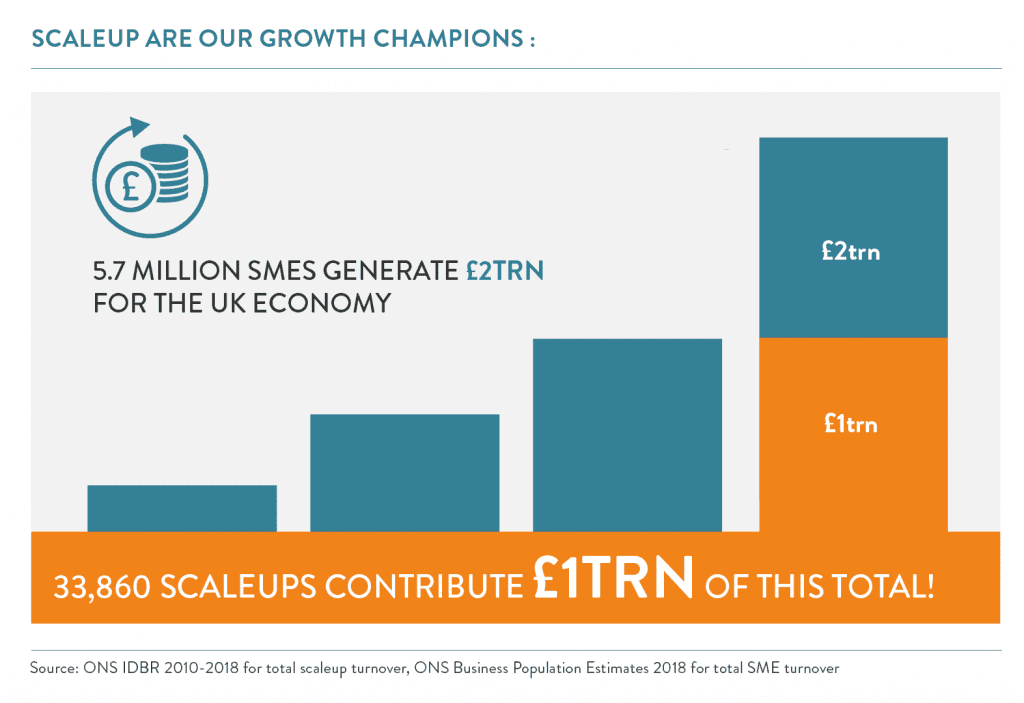On 17th November 2020, Scaleup Review 2020 was launched by the Scaleup Institute at a virtual event. The Scaleup Review which looks at data, trends and support for UK scaleups, is packed with information and policy recommendations. I have scanned it to see how innovation and R&D form an essential part of the scaleup ecosystem.

First some statistics:
The 2020 review reveals that there are nearly 34,000 scaleups in the UK and the total number of UK scaleups is 25 per cent higher than it was in 2013.
A scaleup is a high growth company defined by the OECD as companies that have achieved growth of 20% or more in either employment or turnover year on year for at least two years, and have a minimum employee count of 10 at the start of the observation period.
The forward by Paul Scully MP, Minister for Small Business, Consumers and Labour Markets highlights some key support mechanisms: “We have increasingly focused the efforts of our network of 38 Growth Hubs across England to identify and support high growth businesses.”
The Chair’s Forward is upbeat saying that: “The UK is becoming a ScaleUp Nation, as well as the ScaleUp Institute‘s constant work with the ecosystem to address emerging needs there is the development of the Future Fund [revised application deadline January 31 2021] and enhanced Innovate UK funding earlier this year”. Both of these funds are focused on supporting innovative companies. The definition of innovative is less clear in regard to the Future Fund, but Innovate UK funding clearly supports R&D based innovation.
Alex Hickman, business advisor to Prime Minister Boris Johnson, at the launch said “… we have some of the best businesses, the best minds, in sectors that we know are going to grow quickly in coming years, such as life sciences, AI and robotics”. These three sectors are significant because their growth is largely built on the achievement of cutting edge R&D and innovation.
Northern Powerhouse Partnership vice-chair Lord Jim O’Neill saw one of the upsides to the current pandemic challenges as that “we might actually get some productivity boost as a result of…the crisis” as the pandemic has been “a highly conducive subjective stimulant to creativity and innovation”.
The Scaleup Review 2020 points out that:
“Access to R&D and Innovate UK services are seen as vital pillars to scaling although scaleups are not yet collaborating enough with universities; only two in ten business leaders said they had collaborated with universities or research institutions to develop a new product or service in the past three years.”
“Infrastructure hubs and science parks continue to provide valuable support. This is particularly the case where they have established research links with universities and can provide the research and development expertise and flexible infrastructure…”
Scaleups are described as “highly innovative” and “significant adopters of new technologies”.
Infact “three out of four scaleups have introduced a new or significantly improved product/process/service in the last 3 years”.
Survey’s conducted with scaleup leaders and CEO’s found that:
“Already significant users of collaborative tools, one in five scaleups are currently using big data or AI as part of their day to day operations. In the future they plan to further exploit these technologies for growth even more with 4 in 10 expecting to use AI, one third planning to use big data, and one quarter dialling up the use of robotics (24%).”
“Maintaining access to innovation and R&D funding schemes provided by the EU, or replacing these with similar homegrown offerings, is seen as important to six in ten scaleup leaders. Such schemes often facilitate innovative longer-term projects.”
Research and development tax credits continue to be a key part of the funding mix for innovative scaleups.
Book a free R&D Assessment here:
Links:
Future Fund: https://www.gov.uk/guidance/future-fund
Scaleup Review 2020: https://www.scaleupinstitute.org.uk/scaleup-review-2020/
Innovate UK is part if UKRI (UK Research and Innovation): https://www.ukri.org/
